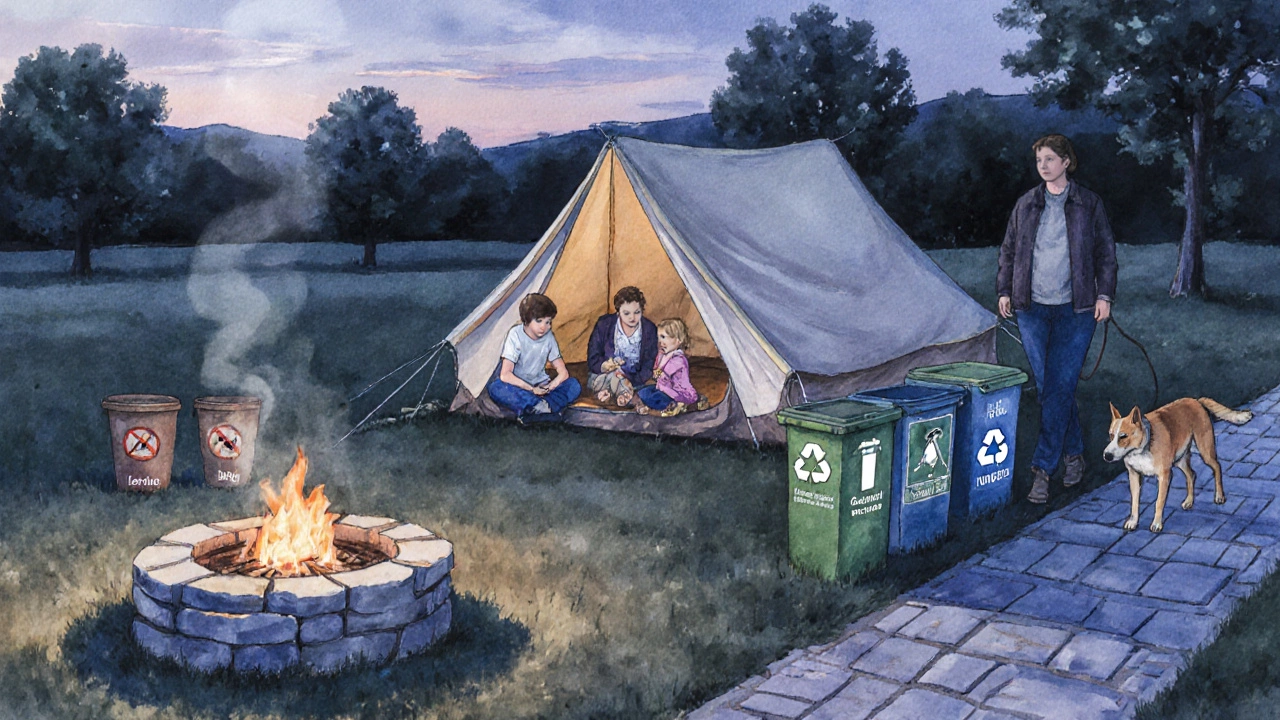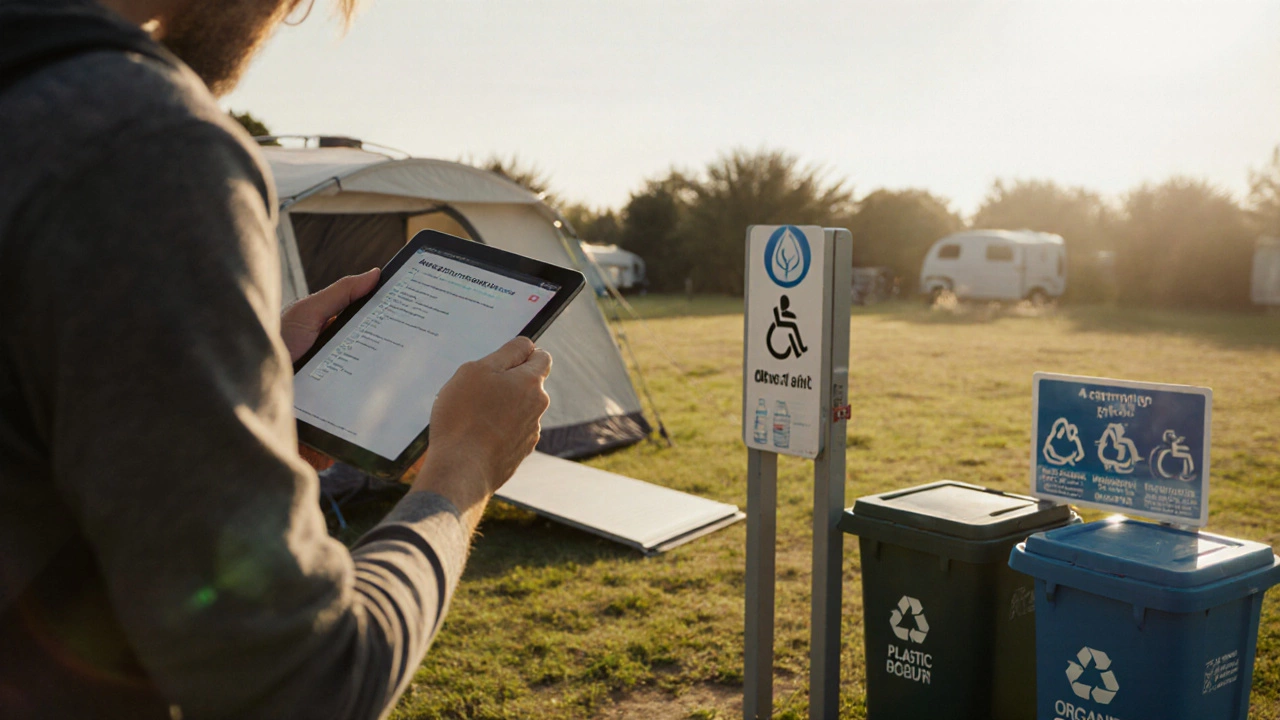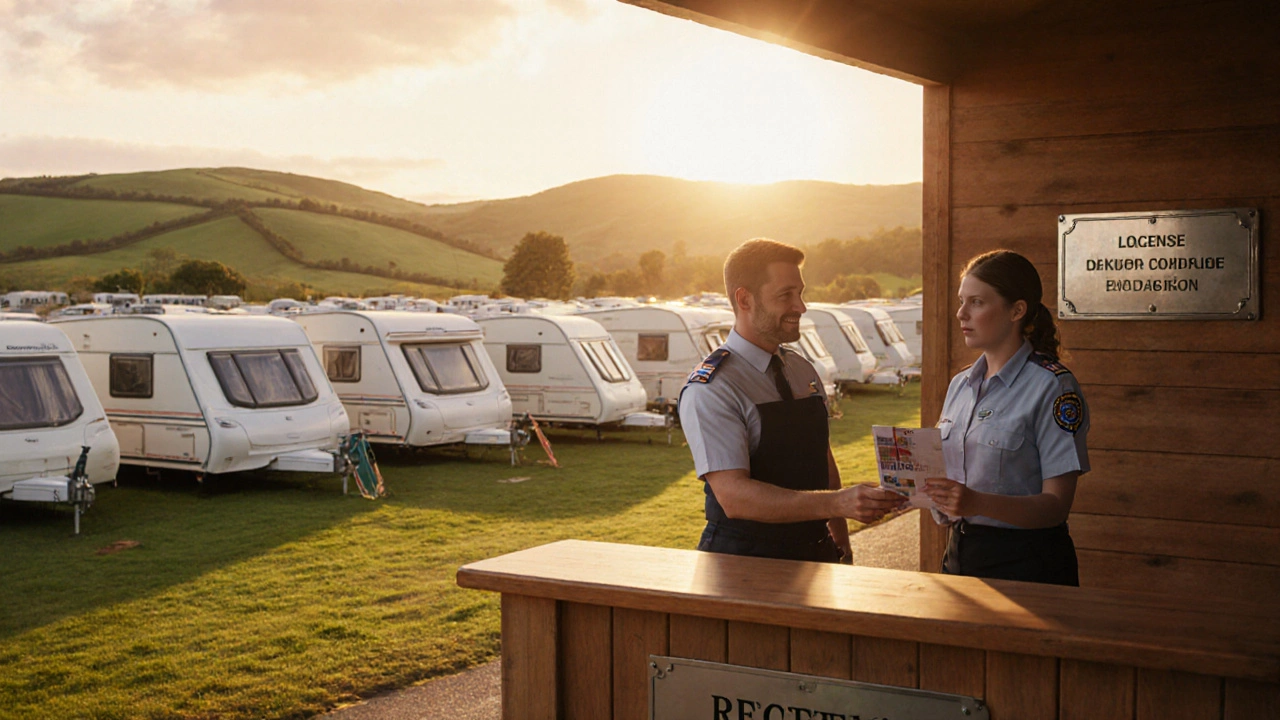UK Campsite Compliance Checker
Check if your chosen campsite meets UK regulations for fire safety, noise, waste management, pet policies, and accessibility. This tool uses the latest 2025 guidelines from the article.
Quick Summary
- All UK campsites need a licence from the local council and must follow the Health & Safety at Work Act.
- Core rules - no open fires (except where allowed), quiet hours after 10pm, proper waste disposal, and pet control - apply everywhere.
- Specific site types (caravan, glamping, national park) add extra layers such as fire‑ban periods, vehicle size limits, and protected wildlife rules.
- Check the site’s licence number, fire‑risk status, and waste‑management plan before you book.
- Use the checklist at the end to verify a campsite complies with the UK campsite rules.
When you look for a place to pitch a tent or park a motorhome in Britain, you’re really navigating a patchwork of laws, local council licences, and industry standards. Understanding those rules helps you avoid fines, stay safe, and enjoy a hassle‑free holiday. Below you’ll find every rule that matters in 2025, broken down by who it affects and where it applies.
Understanding UK Campsite Licensing
In the UK, a Campsite is a designated area where the public can pitch a tent, park a caravan, or stay in a static caravan or glamping unit, usually for a fee and under specific regulations. Every commercial campsite must hold a licence issued by the local Council that confirms the site meets health‑and‑safety, fire‑risk, and environmental standards.
The licence number must be displayed prominently on the site’s website, promotional material, and at the reception desk. Without this number, the site is operating illegally and you should avoid it.
Core Rules That Apply to All Sites
- Fire safety: Open fires are only allowed in designated fire pits or communal areas that carry a fire‑risk certificate. Many parks enforce a total ban during dry periods (usually May‑September).
- Quiet hours: Noise must be kept to a minimum after 10pm. This is enforced by most councils under the Environmental Protection Act.
- Waste management: Campsites must provide separate bins for recycling, general waste, and food waste. You’re required to empty your own bin daily and never dump waste off‑site.
- Pet control: Dogs must be kept on a lead in high‑traffic areas and are usually required to be registered with the site’s pet‑policy form.
- Health & safety: The site must have a clear evacuation plan, first‑aid provision, and regular safety inspections as required by the Health & Safety at Work Act 1974.

Site‑Specific Rules
Different types of sites add their own layers of regulation. Below is a quick look at what you’ll encounter.
| Rule | Caravan Site | Glamping Site | National Park Site | Wild Camping (Permitted Areas) |
|---|---|---|---|---|
| Fire bans | Designated fire pits only; seasonal bans apply. | Central fire pits; many glamps prohibit any open fire. | Strict fire‑risk zones; often no fires at all. | Allowed only where the Countryside Code permits; often prohibited in high‑risk zones. |
| Pet policy | Leashed in communal areas; some sites allow free‑run dogs. | Often no pets, especially luxury units. | Leashed; must be under control near wildlife. | Allowed but must not disturb livestock or wildlife. |
| Vehicle size limit | Typically up to 7m for caravans, 9m for motorhomes. | Usually no vehicle, only foot traffic. | Varies; many restrict >6m vehicles. | None, but must park legally off‑road. |
| Noise restrictions | Quiet after 10pm; some sites enforce 9pm in residential zones. | Strict quiet hours, often 8pm. | Quiet after 9pm in most parks. | Follow local bylaws; generally quiet after 10pm. |
| Accessibility | Accessible pitches with flat ground and utility hookups. | Often fully accessible cabins with en‑suite facilities. | Many sites have at least two accessible plots. | Rarely accessible; terrain may be uneven. |
Health & Safety Essentials
Every campsite must comply with British Standard BS 8485, which covers the design and management of camping and caravanning sites. The key points are:
- Safe drinking water or a verified water‑filtration system.
- Regular checks on electrical installations and gas appliances.
- Clear signage for hazards, such as steep slopes or low‑lying water.
- First‑aid kits and trained staff on‑site.
If a site advertises “BS8485 compliant” you can trust that it meets these minimum safety standards.
Managing Pets & Animals
Pets are a huge part of the camping experience for many families, but the UK has strict rules to protect wildlife and other guests.
- All dogs must be registered with the site’s Pet Policy form and have up‑to‑date vaccinations.
- Pets are not allowed in children’s play areas, swimming pools, or designated wildlife zones.
- Owners are responsible for cleaning up after their animals and must use the provided bins.
If you’re travelling with larger animals (horses, llamas), you’ll need a specialised “livestock friendly” site that holds a separate licence from the Agriculture Department.
Waste & Sustainability
Environmental stewardship is now a licensing requirement. Campsites must:
- Provide a Waste Disposal system with separate bins for recycling, compost, and landfill.
- Offer refill stations for water bottles to cut plastic waste.
- Run a regular waste‑audit and publish results to the public.
When you see a site promoting “zero‑waste” policies, check that they have visible recycling stations and clear signage - it’s not just marketing.

Accessibility & Inclusivity
Under the Equality Act 2010, campsites must provide reasonable adjustments for disabled guests.
- At least two accessible pitches with level ground, extra width, and nearby accessible restrooms.
- Raised toilet seats, grab rails, and tactile guide paths.
- Staff trained in basic disability awareness.
If a site claims “fully accessible,” verify that they list specific facilities rather than a vague statement.
How to Check a Site’s Compliance Before Booking
- Look for the licence number on the website. It should match the local council’s register.
- Confirm the site is BS8485 compliant - usually listed in the facilities section.
- Read the fire‑risk warnings and seasonal bans. If the site doesn’t publish dates, ask directly.
- Check the pet policy, waste‑management plan, and accessibility details.
- Read recent guest reviews for any hidden breaches, such as frequent noise complaints or broken facilities.
Next‑Step Checklist for Campers
- ✅ Verify the campsite licence number with the local council website.
- ✅ Ensure the site is BS8485 compliant.
- ✅ Review fire‑risk, pet, and waste policies.
- ✅ Confirm accessibility features if needed.
- ✅ Pack a portable fire extinguisher and a small first‑aid kit for extra safety.
Frequently Asked Questions
Do all UK campsites need a licence?
Yes. Any commercial campsite that charges a fee must hold a licence from the local council. The licence number must be displayed publicly and can be verified on the council’s website.
Can I light a campfire anywhere on a campsite?
No. Fires are only allowed in designated fire pits or communal areas that have a fire‑risk certificate. During summer fire bans, even those pits may be closed.
What are the quiet‑hour rules?
Most sites enforce quiet after 10pm, but some parks in residential zones start at 9pm. The exact time should be listed in the site’s rules sheet.
Are pets always allowed?
Pet policies vary. Most caravan sites allow dogs on leashes, while many glamping sites ban pets altogether. Always read the site’s pet‑policy before booking.
How can I tell if a campsite is environmentally responsible?
Look for clear waste‑segregation bins, water‑refill stations, and published waste‑audit results. Sites that advertise “zero‑waste” or “eco‑friendly” usually have these facilities listed.
